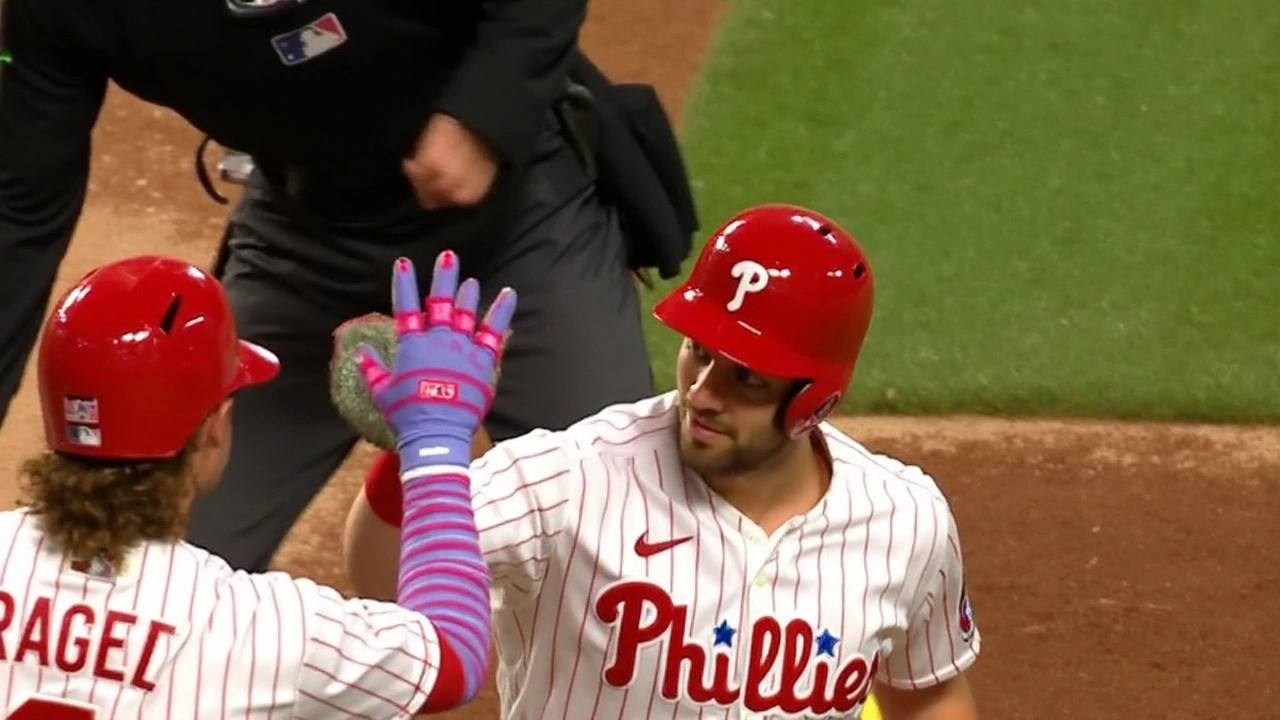Ranger Suárez fans career-high 12 as Phillies thump Mets, widen NL East lead

Career night on the mound, statement night in the standings
Citizens Bank Park got a clinic. The Phillies rode six scoreless, one-hit innings from Ranger Suárez and a power show from Kyle Schwarber to a 9-3 win over the Mets, stretching their NL East cushion to nine games with 17 to go. Philadelphia moved to 85-60; New York dropped to 76-69 as the clock ticked a little louder on the race.
Suárez doesn’t usually hunt strikeouts, and he said as much postgame. But this start was different. He piled up a career-best 12 punchouts, carving through the heart of New York’s order and finishing at-bats when he got to two strikes. The lefty threw 99 pitches, 60 for strikes, and gave the Mets almost nothing to square up.
The headline matchups tilted hard in his favor. Juan Soto and Pete Alonso each went 0-for-3 with three strikeouts against Suárez, accounting for half of his whiffs. That’s not just dominance; that’s game-planning and execution against the bats designed to beat you.
The shape of the outing was textbook efficiency for a pitcher who lives on rhythm. He attacked early, expanded late, and kept hitters guessing between sinker, changeup, and a breaking ball he could land for called strikes. Most contact was soft. The only hit felt like an interruption rather than a threat, and there was never a sense the inning would unravel.
If this looked familiar, it’s because it was. Last Thursday, Suárez blanked the NL-leading Brewers for six. Zoom out and the pattern pops: he has a 1.69 ERA in nine starts against teams currently sitting in postseason position. That matters more than a highlight reel. It’s the kind of trend front offices trust when they map rotations for October.
Managerial math also checked out. Six innings and 99 pitches is a sweet spot for a contender in September: present impact without emptying the tank. The bullpen handled the last three frames, and while New York pushed across late runs to dodge the shutout, the night’s tone was set long before the relievers took over.
For Philadelphia, this is about more than one great start. Suárez’s surge improves a rotation that already leans on big-game arms. Slot him next to the top two, and you see why the Phillies can shorten games, stress opponents with different looks, and cover a seven-game series without leaning too hard on any single pitcher.
Schwarber’s 50th, a deep lineup, and the October road
The game also carried a franchise milestone. Kyle Schwarber crushed his 50th homer of the season, joining Ryan Howard (2006) as the only Phillies to reach that number. The ball left no doubt and the reaction said it all—teammates spilled out of the dugout, the crowd stood, and the scoreboard crew had their cue ready. You don’t see 50 every year; when it happens, it redefines the season for both the player and the club.
Schwarber’s big swing fit the night’s theme. The lineup stacked quality at-bats, jumped on mistakes, and kept traffic on the bases. Nine runs doesn’t require a perfect script—just steady pressure and a few swings with leverage. On a night when the ace-level start arrived, the bats made sure it mattered.
As for the standings, the math keeps tilting toward red pinstripes. A nine-game lead with 17 remaining is comfort, not complacency. The Phillies can start thinking through the practical stuff: aligning the rotation, managing workloads, and giving regulars a few softer days without losing edge. Home field in the early rounds is within reach, and nights like this move that target closer.
The Mets have a different calculus. At 76-69, they’re right in the thick of the Wild Card picture, but margins are thin. The takeaway is simple: when the middle of your order gets neutralized, it’s tough to chase down a game on the road against a locked-in starter. The fix is just as simple, if not easy—shorten swings, extend counts, and force the bullpen to carry weight sooner.
One subplot worth tracking is how Suárez’s approach will play in a postseason series against teams that have seen him multiple times. The book on him—pace, precision, and late movement—doesn’t vanish with familiarity, but repeat looks change how hitters set up. The counter is already visible: early strikes, elevated miss spots to change eye levels, and that changeup fading under barrels when hitters gear up for heat.
Philadelphia’s broader build amplifies all of this. With Bryce Harper and Trea Turner setting tables and Alec Bohm spraying contact, Schwarber doesn’t have to carry the lineup even when he’s mashing. That balance means different players can win different games—exactly what you want in October, when a series can swing on the seventh hitter’s two-out double as much as a superstar’s moonshot.
New York will get another crack, and the season’s rhythm guarantees quick turnarounds. But this one belongs to the Phillies and their left-hander who, for one night, swapped his pitch-to-contact label for a strikeout crown. The scoreboard, the standings, and the mood in South Philly all pointed the same way: this team knows how to land a punch and hold a lead.
- Final: Phillies 9, Mets 3
- Ranger Suárez: 6 IP, 1 H, 0 R, 12 K, 99 pitches, 60 strikes
- Standings snapshot: Phillies 85-60; Mets 76-69; Philadelphia leads NL East by nine games with 17 to play
- Context: Suárez owns a 1.69 ERA in nine starts vs. current postseason-positioned clubs
- Milestone: Kyle Schwarber reaches 50 home runs, second in Phillies history after Ryan Howard (2006)